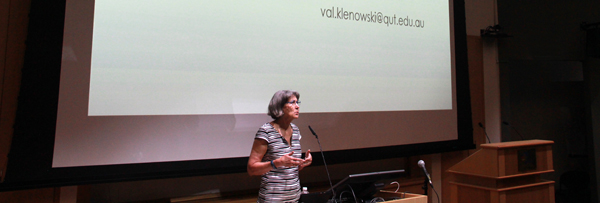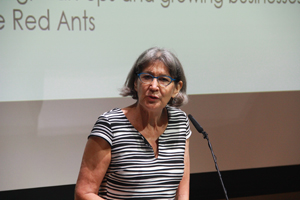Young Children’s Voices in Mathematical Problem Solving
Contributed by Dr Ho Siew Yin and Sng Wei Qin Abbie, from NTUC First Campus, for SingTeach Virtual […]
Read More
Australian Professor Val Klenowski believes that the search for quality assessment practice should restore teachers’ professional assessment judgment to meet the learning needs of students in our changing world. This article is based on a section of her keynote address during the 3rd Annual Assessment Colloquium 2016 at NIE titled “The Search for Quality Assessment Practice: Putting Teacher Judgement Back into the Frame”.

Prof Val giving a keynote address during the 3rd Annual Assessment Colloquium 2016 at NIE.
Just the other day when I was in a cab on my way to NIE, my driver said: “I think teachers deserve a pay increase.” I thought what he said was very impressive, so we continued that conversation and he added, “Teachers are the only people who can change a Prime Minister or President’s mindset.”
He is very much referring to the impact that we as educators have on young people’s identities. I always think very carefully about my teaching and about students. I am really interested in the conversations I have had with teachers and students.
I frequently use the case study approach in my research because what you can observe in the classroom is very important.
So I am going to talk about the importance of the teacher-student learning relationship based on my observations and research. This is where teacher judgment and understanding of how to use assessment to improve learning comes into play.
To begin, I am going to talk about the millennial generation and the changing expectations of industry and business, and what that means for teachers in classroom assessment.
“As expectations change and technology changes the way we work, a shift in our thinking is required for innovation to happen.”
– Prof Val, on the need to adapt to changing times
The millennial generation comprises 25 per cent of the world’s population and is aged between 16 and 30 years. Research finds that this generation values authenticity, autonomy, purpose and passion in their work. This particular generation also has a social conscience and really wants to make a difference.
We know that this generation has experienced the power of social media, digital media, word-of-mouth advertising and the online marketplace. It is the generation behind start-ups like Grab, Uber, Airbnb, Etsy. And so, at an Australian summit this year, this generation was described as risk-takers and growth-makers.
It was noted at the same summit that there has been a shift in values and expectations. This shift has had a profound effect on the way millennials are living, learning and working, but some of our policies aren’t really helpful in encouraging the innovation needed.
So the key idea is that first, we need to nurture the right skills. This has implications for us as teachers. As expectations change and technology changes the way we work, a shift in our thinking is required for innovation to happen.

Prof Val shares that teachers have to view students as individuals and address their learning needs accordingly.
I was really interested to see how these changes are playing out in Singapore where you have a history of examination and high-stakes assessment. I found the millennial generation were reporting that when assessing applicants for a particular job position, it is not so much the stellar grades that matter, but whether the applicant has the right attributes to fit with the team and a good work ethic.
The element of fun is also something that appears to be really important in the work environment. And I must say it is very important in the learning environment as well.
This context has important implications for learning and assessment. Research suggests that students today are learning more outside of the formal classroom context and wanting to develop competencies and skills for innovation and growth.
What our students then really need to learn today are skills that are needed beyond the classrooms – competence, curiosity, collaboration, communication, creativity, commitment and cross-leadership. Such competencies also include personality traits such as emotional resilience and conscientiousness.
To achieve these learning outcomes, our assessment, policies and practices need to first nurture and support the development of the right skillsets. Second, we need to motivate our students by providing them with opportunities to achieve something meaningful or something that matters. Third, we also need to involve our students in ideas for change and create an assessment experience that will provide them with cognitive challenges to scale up.
In addition to applying pedagogic and reform principles to changing assessment, I would argue that the personal element in the teacher-student relationship is also important. We need to ensure that in our interactions with our students, we treat them with respect and in a way that helps us achieve our intended learning outcomes.
In a recent Australian Research Council project that focused on the use of assessment data to promote equity in schools, we sought to build teacher capacity by supporting the use of critical inquiry to interrogate assessment data and the use of professional judgment to modify teaching practices.
One teacher chose to focus on two students who were struggling with their writing. She was concerned about their emotional stability, lack of confidence and inability to progress. In her inquiry, she came to understand her students’ interests and difficulties and realized that she needed to change her pedagogy and curriculum to motivate and engage these students.
The point I am making here is that sometimes, students will slip through the cracks. Sometimes, we have to make that extra effort to find the things that are disrupting our students.
Too often, policymakers and stakeholders are seeking what works. In this search, one cannot lose sight of the uniqueness and humanity of individuals and reduce them to just numbers.
It is important to acknowledge that success and failure are apparently unstable yet equally required to develop skills such as curiosity, flexibility and resilience.
“We need to ensure that in our interactions with our students, we treat them with respect and in a way that helps us achieve our intended learning outcomes.”
– Prof Val, on the importance of fostering strong teacher-student relationships to enhance student learning